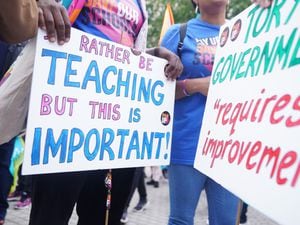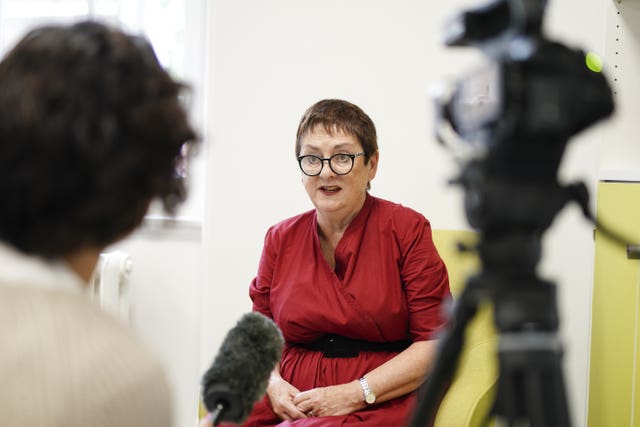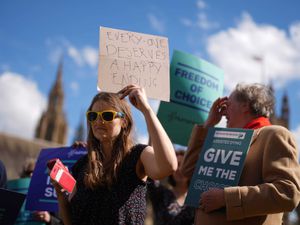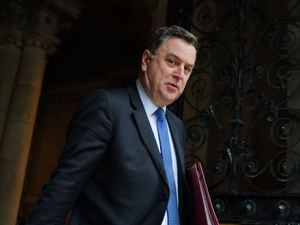Co-ordinated strike action by teachers in autumn off as unions accept pay rise
But the NASUWT teaching union has said it remains committed to industrial action in the autumn despite the Government’s pay offer.

Co-ordinated strike action by four education unions in the autumn will not go ahead after members accepted a 6.5% pay rise for teachers and school leaders in England.
The National Education Union (NEU), the UK’s largest teaching union, said 86% of its teacher members in England who took part in an electronic ballot voted to accept the Government’s offer and call off strikes.
Members of the National Association of Head Teachers (NAHT), who took part in an online ballot this month, also voted to accept the 6.5% pay offer – with 85% voting in favour of the pay award for 2023-24.
The NASUWT teaching union said 77.6% of its members who took part in a consultative survey indicated they were willing to accept the pay offer for teachers and school leaders in England.
Members of the Association of School and College Leaders (ASCL) – which called off its ballot on strike action in England – have already accepted the rise.
Education Secretary Gillian Keegan described the decision as “good news” for teachers, parents, and children as she said the deal would bring “an end to the disruption” in schools in England.
Prime Minister Rishi Sunak, writing on Twitter, said: “This is a big moment.”
It comes after teacher members of the NEU staged eight days of strike action in schools across England since February in a pay dispute with the Government.
Four education unions had been considering staging co-ordinated walkouts in the autumn term, but their general secretaries recommended members accept the 6.5% pay rise offered earlier this month.
Co-ordinated strike action by all four unions representing school leaders and teachers next term is off the cards, but the NASUWT union has not ruled out taking action in the autumn.
Earlier this month, before the Government offered a 6.5% pay rise, teachers in England represented by the NASUWT voted for industrial action.
The union – which passed the 50% ballot turnout required by law – said at the time it planned to stage action short of strikes from September.

Speaking after the result on Monday, Dr Patrick Roach, general secretary of the NASUWT, said: “On industrial action, we remain committed to industrial action in the autumn which is expected to include in the first instance action short of strike action to address our members’ ongoing concerns over excessive workload and working hours.
“No decision has been taken regarding strike action, but this has not been ruled out.”
He added that NASUWT members “do not agree that sufficient action is yet being taken to address their concerns over excessive workload”.
The NASUWT has written to the Education Secretary calling on the Government to do more to address its members’ “demands for pay restoration and immediate action to tackle excessive workload and long working hours”.
Both the NEU and NAHT have secured mandates for strike action for the next six months, but the unions have indicated that walkouts over pay will now not go ahead in the autumn term.
Paul Whiteman, general secretary of the NAHT, said: “Our ballot results today clearly show the strength of feeling within the education profession that action is urgently needed.
“School leaders are reasonable people, and striking is very much a last resort, but our members have felt compelled to vote for action by a government that simply wasn’t listening.
“Fortunately, the actions of our members and the members of other education unions have forced the government to finally hear the profession’s concerns, and to make an offer that our members can live with. As a result, the prospect of co-ordinated strike action next term is no longer necessary.”
Joint NEU general secretaries Dr Mary Bousted and Kevin Courtney said: “As a democratic union, the NEU leadership promised members that any pay and funding offer given by Government that warranted their consideration would be put to them. Members have spoken very clearly and in great numbers.
“The NEU submissions to the STRB went a long way towards changing the Government’s position on pay and funding. The strike action taken by our members also shifted the dial, securing the highest pay award for over thirty years. Members should be proud they have also secured extra funding for schools.”
Ms Keegan said: “The deal brings an end to the disruption faced by parents and young people and means we can focus on what matters most, giving our children a world-class education.
“That means tackling persistent absence and getting every child through the school gates every day, a relentless focus on closing the gap between disadvantaged pupils and their peers, and continued action to help young people make up for time lost during the pandemic.”





